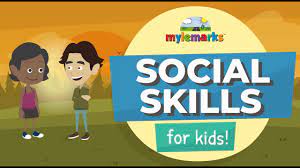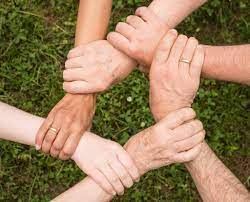
Unlocking the Power of Social Skills: Nurturing Strong Connections for Kids
Developing Social Skills: Unlocking the Power of Connection for Kids
Social skills are essential for children to navigate the world around them. These skills go beyond simple manners and politeness; they encompass the ability to communicate effectively, build relationships, and cooperate with others. By nurturing these social skills from an early age, we empower children to form meaningful connections and thrive in various social settings.
One of the fundamental social skills is effective communication. Encouraging children to express themselves clearly and actively listen to others fosters healthy interactions. Through open-ended discussions, storytelling, and role-playing activities, kids can learn how to articulate their thoughts and feelings while respecting different perspectives.
Empathy is another crucial skill that allows children to understand and share the feelings of others. By teaching children to put themselves in someone else’s shoes, they develop compassion and kindness. Engaging in activities like storytelling or volunteering in community projects helps kids grasp the concept of empathy and its importance in building strong relationships.
Cooperation is a skill that enables children to work together towards a common goal. It teaches them compromise, problem-solving, and teamwork. Engaging kids in team sports or group projects encourages them to collaborate effectively, respect others’ opinions, and contribute their unique strengths for collective success.
Building self-confidence is also vital for healthy social development. Encouraging children to express themselves without fear of judgment empowers them to engage with others confidently. Praising their efforts rather than focusing solely on achievements helps foster a growth mindset where they learn from mistakes and embrace challenges.
Respecting boundaries is an essential aspect of social skills as well. Teaching kids about personal space, consent, and appropriate behavior ensures they understand how their actions can affect others. Role-playing scenarios that demonstrate different boundaries help children develop empathy for personal boundaries while learning how to assert their own.
In today’s digital age, it’s crucial to address digital etiquette as part of social skill development. Teaching children about responsible online behavior, cyberbullying awareness, and the impact of their digital footprint prepares them for safe and respectful interactions in the virtual world.
Parents, caregivers, and educators play a vital role in nurturing social skills. By providing opportunities for children to engage in group activities, encouraging positive interactions with peers, and modeling good social behavior themselves, adults can create an environment where social skills flourish.
At Kids ‘N Action, we understand the importance of social skill development. Our interactive play spaces and engaging workshops are designed to encourage cooperation, communication, empathy, and respect. Through exciting games and collaborative activities, we aim to equip children with the tools they need to thrive socially.
Remember that every child develops at their own pace. Patience and consistent encouragement are key when helping children build their social skills. By investing time and effort into fostering these skills early on, we empower children to form strong connections that will benefit them throughout their lives.
So let’s embark on this journey together – unlocking the power of connection through social skills for our kids.
Common Queries About Social Skills for Children: Explained in English (UK)
- What are social skill lessons?
- What is social skills in simple words?
- What social skills should a child have?
- What are the 4 social skills?
What are social skill lessons?
Social skill lessons are structured activities or programs designed to teach children the necessary skills for effective social interactions. These lessons focus on developing various aspects of social skills, such as communication, empathy, cooperation, problem-solving, and self-confidence.
Social skill lessons typically involve a combination of instruction, practice, and feedback. They can be conducted in various settings, including schools, community centers, or even at home. These lessons may be led by teachers, therapists, or trained professionals who specialize in social skill development.
The specific content and activities of social skill lessons can vary depending on the age group and individual needs of the children involved. Some common elements of social skill lessons include:
- Instruction: Children are taught about specific social skills and their importance in building positive relationships. They learn about concepts like active listening, body language interpretation, conflict resolution strategies, and respectful communication.
- Role-playing: Children engage in role-playing scenarios where they can practice applying the social skills they have learned. This allows them to simulate real-life situations and develop strategies for handling different social interactions effectively.
- Group activities: Collaborative games or projects are used to encourage teamwork and cooperation among children. These activities provide opportunities for children to work together towards a common goal while practicing important social skills like sharing, taking turns, and compromising.
- Problem-solving exercises: Children are presented with hypothetical or real-life problems that require them to think critically and find solutions together. This helps develop their problem-solving abilities while fostering communication and collaboration.
- Feedback and reinforcement: Throughout the lessons, children receive constructive feedback on their social interactions to help them improve their skills further. Positive reinforcement is also provided to motivate and encourage their progress.
Social skill lessons aim to provide a structured framework for children to learn and practice essential social skills in a supportive environment. By participating in these lessons regularly over time, children can develop greater self-awareness, improved communication abilities, increased empathy towards others, and enhanced confidence in social situations.
It is important to note that social skill lessons are not a one-time fix but rather an ongoing process. Consistency and reinforcement at home and in other social settings are crucial for children to generalize and apply the skills they have learned beyond the lesson environment.
Overall, social skill lessons help children develop the necessary tools to navigate social interactions successfully, fostering positive relationships and improving their overall well-being.
What is social skills in simple words?
Social skills refer to the abilities and behaviors that help us interact and communicate effectively with others. They include things like listening, speaking, taking turns, showing empathy, cooperating, and respecting boundaries. Social skills help us build relationships, make friends, work together as a team, and navigate different social situations in a positive and respectful way.
What social skills should a child have?
There are several important social skills that children should develop to navigate the world around them successfully. Here are some key social skills for children:
- Effective Communication: Children should learn to express themselves clearly, listen actively, and understand non-verbal cues. This includes using appropriate language, maintaining eye contact, and taking turns in conversations.
- Empathy: Empathy involves understanding and sharing the feelings of others. Children should be encouraged to consider other people’s perspectives, show kindness, and offer support when someone is in need.
- Cooperation: Cooperation is the ability to work together towards a common goal. Children should learn to collaborate, compromise, and contribute their ideas while respecting others’ opinions.
- Problem-Solving: Teaching children problem-solving skills helps them navigate conflicts and challenges effectively. Encouraging critical thinking, brainstorming solutions, and evaluating consequences can empower children to find resolutions independently.
- Self-Confidence: Building self-confidence allows children to express themselves without fear of judgment or rejection. It involves recognizing their strengths, embracing challenges, and having a positive self-image.
- Respecting Boundaries: Children need to understand personal boundaries and respect the physical and emotional space of others. They should learn about consent, appropriate behavior in different settings, and how their actions can impact others.
- Emotional Regulation: Developing emotional regulation skills helps children manage their emotions appropriately in various situations. This includes identifying emotions, expressing them constructively, and coping with frustration or disappointment.
- Active Listening: Active listening involves paying attention to what others are saying without interrupting or being distracted. Teaching children this skill helps them develop better relationships and understanding with their peers.
- Sharing and Taking Turns: Learning to share toys, take turns during activities or games promotes fairness and cooperation among children.
- Digital Etiquette: In today’s digital age, teaching children about responsible online behavior is crucial for healthy social interactions online. This includes understanding the importance of privacy, cyberbullying awareness, and being mindful of their digital footprint.
Remember that every child develops social skills at their own pace. Encouraging and providing opportunities for children to practice these skills in various social settings can greatly contribute to their social growth and well-being.
What are the 4 social skills?
The four essential social skills are:
- Communication: Effective communication involves expressing oneself clearly and actively listening to others. It includes verbal and non-verbal communication, such as body language and facial expressions.
- Empathy: Empathy is the ability to understand and share the feelings of others. It involves recognizing and respecting different perspectives, showing compassion, and being kind towards others.
- Cooperation: Cooperation is the skill of working together towards a common goal. It involves compromise, problem-solving, teamwork, and respecting others’ opinions and contributions.
- Respecting boundaries: Respecting boundaries means understanding personal space, consent, and appropriate behavior in different social settings. It includes being aware of how our actions can affect others and learning to assert our own boundaries while respecting those of others.
These four social skills are interconnected and play a crucial role in building positive relationships, effective communication, and overall social well-being.


